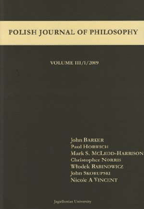From ‘Syntax’ to ‘Semantik’ — Carnap’s Inferentialism and Its Prospects
From ‘Syntax’ to ‘Semantik’ — Carnap’s Inferentialism and Its Prospects
Author(s): Adam T. TubolySubject(s): Philosophy, History of Philosophy, Philosophical Traditions, Special Branches of Philosophy
Published by: Instytut Filozofii Uniwersytetu Jagiellońskiego
Keywords: syntax; semantik; Carnap
Summary/Abstract: The aim of this paper is to provide context for and historical exegesis of Carnap’s alleged move from syntax to semantics. The Orthodox Received View states that there was a radical break, while the Unorthodox Received View holds that Carnap’s syntactical period already had many significant semantical elements. I will argue that both of them are partly right, both of them contain a kernel of truth: it is true that Carnap’s semantical period started after his Logical Syntax of Language — in one sense of semantics. But it is also true that Carnap had already included semantical ideas in LSL: though not (just) in the sense that URV maintains. This latter sense of semantics is related to what is usually called inferentialism, and by getting a clearer picture of Carnap’s original aims, context, and concept-usage, we might be in a better position to approach his alleged inferentialism.
Journal: Polish Journal of Philosophy
- Issue Year: XI/2017
- Issue No: 1
- Page Range: 57-78
- Page Count: 22
- Language: English
- Content File-PDF

